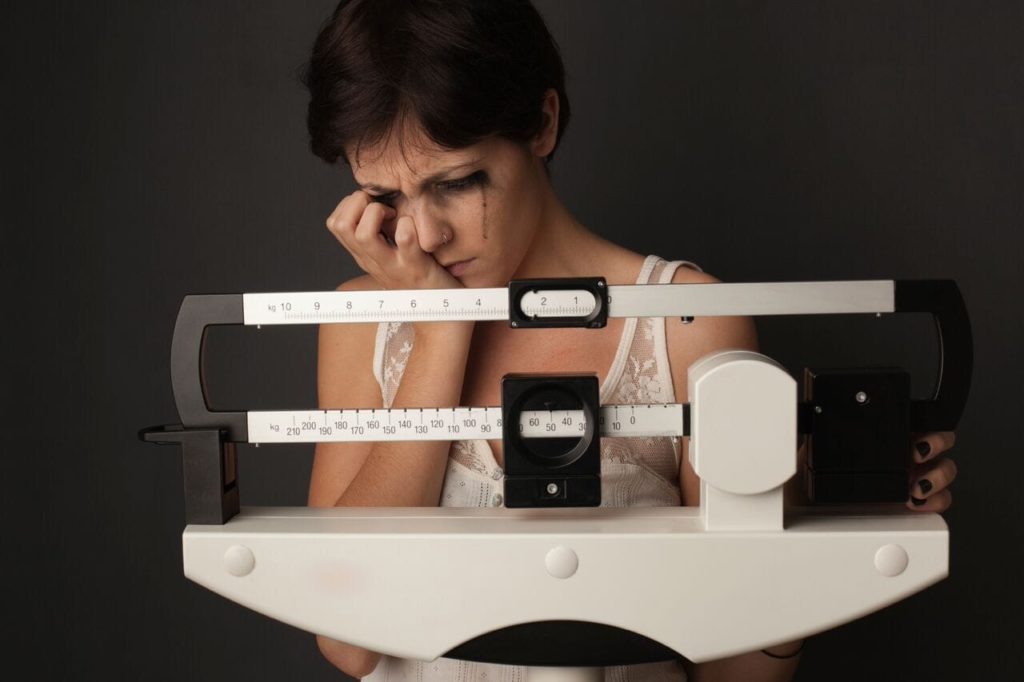A major tenet of many weight-loss programs is weighing yourself daily or weekly, but can this practice put your mental health at risk? Experts say yes. In a study that monitored the weighing practices of 1,900 young adults, Carly Pacanowski, PhD, RD, and her colleagues found that those who weighed themselves more often experienced higher levels of depression and weight concern (thinking a lot about being thinner and fear of gaining weight) and lower self-esteem and body satisfaction. Interestingly, more frequent weighing did not lead to better weight control. Weighing isn’t necessarily problematic for everyone. “There is evidence that self-weighing may be an effective strategy for some adults to prevent weight gain,” says Pacanowski. “However, that doesn’t mean that everyone should adopt this behavior.” Although there’s no clear age cutoff, the study findings suggest that if you’re concerned with your weight and shape or if you’re an adolescent or young adult, self-weighing may not be advisable.
The Problem With Self-Weighing
Pacanowski became interested in the question of whether weighing was a good idea after she conducted a trial at Cornell University evaluating daily self-weighing in overweight and obese adults. “Conducting interviews with the study participants led me to observe how emotionally polarizing weighing can be,” she said. Weighing yourself can lead to self-judgment and guilt, which can fuel a cycle of emotional eating. For some it can promote eating disorders and other unhealthy eating behaviors. With 89% of women unhappy with their weight and 39% worried about the number on the scale, millions are stuck in a counterproductive and potentially harmful cycle. Ginny Leary, LPC, CSAT-C, a therapist at The Ranch mental health treatment center in Tennessee, agrees that weighing yourself can backfire. Having worked with people struggling with eating disorders, she warns that self-weighing can become “a weapon, a gauge for self-worth, a means to maintain a sense of control, and validation for success. The number on the scale becomes the idol, obsession and sometimes the fuel for continued destructive behavior.”
An Obsession That Starts Young
Parents play a critical role in the development of a child’s body image. “Being aware of the way parents comment on their own body and addressing or (ideally) excluding any negative body or weight talk — focusing on what the body can do rather than how it looks— is one way to safeguard a child’s self-image,” suggests Pacanowski. Parents also have a lot of influence over children’s self-weighing behaviors. “With childhood obesity being a major issue in our culture, self-weighing often begins early when a scale is introduced in the home by a parent or caregiver,” says Leary. The problem is young people aren’t always able to interpret the number on the scale as a neutral measure of health. Instead, that number becomes a way to define their self-worth or validation (negative or positive) of their capacity for self-control, potentially leading to self-punishment, depressive symptoms or eating disorder behaviors. “Many of our clients have reported that weighing themselves wasn’t worth the pain and suffering in the long run,” says Leary. For any adult who interacts with a teen or young adult who seems overly concerned with their weight or shape, Pacanowski recommends using the topic of weighing to gather more information. “Self-weighing may be easier to talk about initially than self-esteem or depressive symptoms,” she says.
Alternatives to the Scale
The scale is only one way to monitor your health, and arguably not the most accurate or effective. Your weight doesn’t tell you much about your health or body composition, and doesn’t take into account natural fluctuations that result from changes in the water level in your body. You can learn more from your energy level, sleep quality, skin health, muscle tone, and the way your clothes fit. There are also other tests that can provide useful information (if you can take them without obsessing over the results) such as body fat measurement and the old-fashioned tape measure. If the number on the scale sets you back or leaves you feeling badly about yourself, many experts agree you can be perfectly healthy without weighing yourself. Getting rid of the scale can make you happier, which in turn will likely make you healthier. Sources: “Self-Weighing Throughout Adolescence and Young Adulthood: Implications for Well-Being.”Journal of Nutrition Education and Behavior, Volume 47/Issue 6 (November/December 2015). “How to boost your body confidence.” Happify.com. By Meghan Vivo

